牛津高中英语模块8Unit1Grammar--project语言点讲解
译林版牛津英语八年级上册8A-Unit1-Grammar

比较级的特殊用法 1. 特殊疑问句,A or B?
句中出现的形容词用比较级
Read the profile and complete the sentences. Millie Sandy Amy Peter Kitty Simon
Height 157 170 160 173 155 171 (cm)
Weight 45 50 44 55 40 53 (kg)
50m swimm- 40 38 ing (sec.)
Never let it rest
永不停歇
Till good is better 好上加好
And better is best 精益求精
heavy heavier heaviest
Describing things with adjectives
用形容词描述人或物时,可将其放在名词前面, 也可以放在系动词后面。即:形容词+名词;系动 词+形容词。 常用的系动词有: be, grow, smell, become, keep, sound, feel, look, taste, get, seem, turn …
students. 3. Sandy is _h_e_a_v_ie_r_t_h_a_n_ (heavy) Millie. 4. Peter is _th_e__h_e_a_v_ie_s_t_ (heavy) of the
six students. 5. Among the six students, Millie is _th_e__sl_o_w_e_s_t_ (slow) swimmer.
人教课标版高中英语选修8 Unit1_Grammar名师教学设计
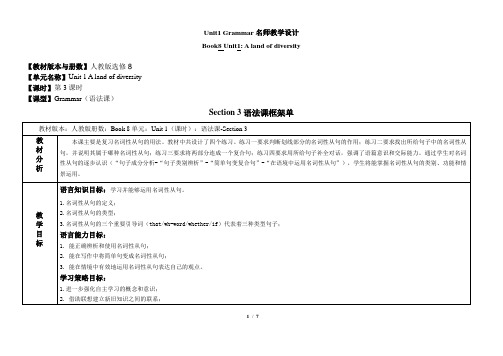
2.T: From the analysis of the sentence patterns, can you tell me what types of noun clauses are there.
S:Noun clauses are classified as subject clause, object clause, predicative clause and appositive clause.
It happened that…碰巧…
It appears that…似乎…
4It is+过去分词+从句
It is reported that…据报道…
It has been proved that…已证实…
It is said that…据说…
it作形式主语和it引导强调句的比较
it作形式主语代替主语从句,主要是为了平衡句子结构,主语从句的连接词有变化。而it引导的强调句则是对句子某一部分进行强调,无论强调的是什么成分,都可用连词that。被强调部分指人是也可用who/whom。例如:
DELC2获取新知识
Step2
Production
(学习
新知)(20mins)
1.Teacher guide Ss to learn the grammar rules of noun clauses.
名词性从句
【概念与分类】在句子中起名词作用的句子叫名词性从句。名词性从句的功能相当于名词词组,它在复合句中能担任主语、宾语、表语、同位语、介词宾语等,因此根据它在句中不同的语法功能,名词从句又可分为主语从句、宾语从句、表语从句和同位语从句。
It hasn’t been decided whether (if) we shall attend the meeting.
牛津高中英语模块8Unit1 M8U1词组 Reading词组 全

M8u1 词组1.the antiques of the literary world 文学世界的古董2.examples of great writing and wisdom 杰出的创作及智慧的典范3.Their language characteristics are quite different from those of modern works.它们的语言特色与现代文学作品有相当大的区别。
4.gather dust on shelves 在书架上落满灰尘5.have nothing to do with 与……无关6.have a place in the world 在世界上占有一席之地7.adapt … from … / be adapted from 从…改编8.an award-winning film based on the novel Emma 根据小说Emma改编的获奖影片e out10.contemporary life11.one chapter at a time12.Some were later performed on stage. 有些后来被搬上了舞台。
13.soap opera14.His tomb reads, “By his death, one of England’s greatest writers is lost to the world.”他的墓碑上写着:“他的辞世令世界失去了一位最伟大的英国作家。
”15.be set in16.in the early 1800s17.abuse sb. 虐待某人 abuse one’s power and authority 滥用职权18.would do … rather than do … / prefer to do … rather than do …19.a twist in the plot 情节上的曲折20.give sb. a large fortune 赠与某人一大笔财富21.as a condition for receiving the fortune 作为获得这笔财富的一个条件22.before long 不久之后23.be ashamed of his background 对他的身世感到羞愧24.have rigid ideas of what it means to be civil 对于文明的内涵有着刻板的理解25.be bent on doing sth.26.win one’s love / have one’s love27.a fancy education 一个华而不实的教育28.a desperate criminal / a criminal on the run 一个铤而走险的罪犯29.along with 与…一道;除了…还有30.The film begins (in) the same way as the novel does. 这部电影与小说以同样的形式开始。
Unit8Grammar课件牛津译林版八年级英语上册

预习导学
二、选一选
when, while, as
1.Timmy was sleeping when the earthquake started.
2.People were running in all directions while pieces of
glass and bricks were falling down.
研读概念,观察形式并总结
1.认真研读第97页过去进行时的概念,观察句子中的动词 形式,指出什么时候用was,什么时候用were。
合作探究
2.总结:在过去进行时态中,当主语是第一或第三人称单 数时,助动词用was;当主语是you或复数时,助动词用were。 其否定句是在was/were后加not,一般疑问句是把was/were提到 句首。肯定回答是:Yes, 主语 + was/were. 否定回答是:No, 主语+wasn’t/weren’t.
3. As Timmy was trying to find his way out, he suddenly
heard some noise above him.
预习导学
4.Millie was watching TV when Andy came into the room. 5. While the boys were playing football, the bell rang.
合作探究
完成练习,核对答案 1.学习单词及短语break, break down。完成A部分的练习, 并核对答案。 2.四位学生分角色朗读对话内容,巩固过去进行时态的用 法。 3.阅读课本第98页B部分的内容,了解并记住when, while 和as的用法。 4.完成B部分的练习,并核对答案。
+Unit1+Friends+Grammar+课件+2024-2025学年牛津译林版八年级英语上册

Comparative Superlative
+ er
+ est
→ longer → longest
→ smaller → smallest
+r
+ st
→ finer
→ finest
→ nicer
→ nicest
- y + ier
- y + iest
→ easier → prettier
→ easiest → prettiest
My book is more interesting than his. His book is less interesting than mine.
Language Goal
➢ 1.能熟悉并正确运用本课时的重点单词和 短语。
➢ 2.能掌握形容词的比较级和最高级的构成 和基本用法。
Comparative and superlative adjectives
The bike is _fa_s_t___.
The tractor is _f_a_st_e_r_ .
The car is _th_e__fa_s_t_es_t .
Compare them
(Comparative and superlative adjectives)
形容词通常有三种形式: 原级,比较 级和最高级,用来表示人或事物在某 方面的不同程度。如:
最高级 + st
nicest finest 把 y 改成 i + est prettiest easiest
P12, A
thin — thinner, thinnest
clean— cleaner, cleanest sad— sadder, saddest
(全)译林牛津版高中英语模块8_Unit 1~4单词
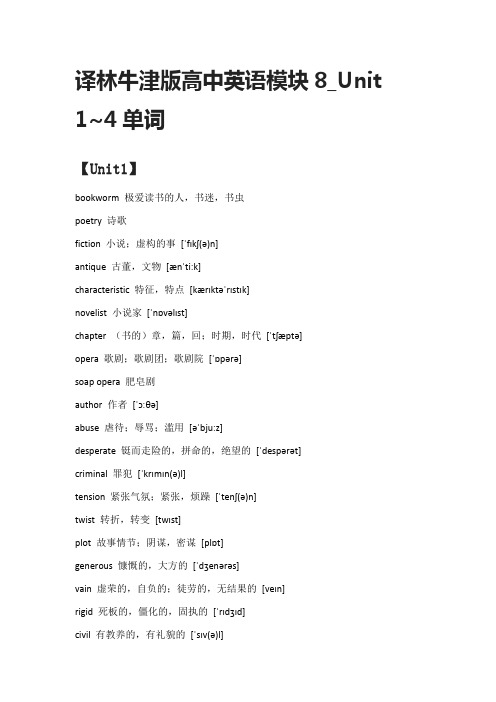
译林牛津版高中英语模块8_Unit 1~4单词【Unit1】bookworm 极爱读书的人,书迷,书虫poetry 诗歌fiction 小说;虚构的事[ˈfɪkʃ(ə)n]antique 古董,文物[ænˈtiːk]characteristic 特征,特点[kærɪktəˈrɪstɪk]novelist 小说家[ˈnɒvəlɪst]chapter (书的)章,篇,回;时期,时代[ˈtʃæptə]opera 歌剧;歌剧团;歌剧院[ˈɒpərə]soap opera 肥皂剧author 作者[ˈɔːθə]abuse 虐待;辱骂;滥用[əˈbjuːz]desperate 铤而走险的,拼命的,绝望的[ˈdespərət]criminal 罪犯[ˈkrɪmɪn(ə)l]tension 紧张气氛;紧张,烦躁[ˈtenʃ(ə)n]twist 转折,转变[twɪst]plot 故事情节;阴谋,密谋[plɒt]generous 慷慨的,大方的[ˈdʒenərəs]vain 虚荣的,自负的;徒劳的,无结果的[veɪn]rigid 死板的,僵化的,固执的[ˈrɪdʒɪd]civil 有教养的,有礼貌的[ˈsɪv(ə)l]bent 弯曲的;驼背的;不诚实的[bend]bent on(doing) something 决心做某事(通常指坏事)theme 主题,主题思想;主题音乐[θiːm]violent 暴力的,粗暴的[ˈvaɪələnt]on the run 躲避;忙碌,不停地奔波painter 画家['peɪntə]live up to 达到,符合(期望)millionaire 百万富翁[mɪljəˈneə]vice 恶行,恶习,罪恶[vaɪs]reform (使)改过,自新,改造[rɪˈfɔːm]violence 暴力,暴行[ˈvaɪələns]resist 反抗,抵制,抵挡[rɪˈzɪst]reunite (使)重逢,再相聚home-made 自制的;家里做的;国产的['həʊm'meɪd]spin (使)快速旋转;(使)急转身;纺纱;吐丝结网[spɪn] sneaker 运动鞋[sneɪk]pin 使不能动弹,按住;(用大头针等)固定,别上,钉住[pɪn] worn out 破烂不堪的,废旧的;精疲力尽的envelope 信封[ˈenvələʊp]brand new 全新的,崭新的spit 吐唾沫(表示愤怒或鄙视)[spæt]chest 胸部,胸膛[tʃest]modern-day 现代的;当代的stepmother 继母stepsister 异父(异母)姊妹rag 破布,破衣服;抹布[ræɡ]Ireland 爱尔兰[ˈaɪələnd]rescue 救援,营救[ˈreskjuː]come to one’s rescue 救援某人,帮助某人Scotland 苏格兰[ˈskɒtlənd]supreme 最高的,至高无上的[suːˈpriːm]reputation 名誉,名声[repjʊˈteɪʃ(ə)n]debt 债务,欠款[det]holy 神圣的,圣洁的[ˈhəʊli]widow 遗孀,寡妇[ˈwɪdəʊ]monument 纪念碑,纪念馆,纪念塑像;古迹[ˈmɒnjʊmənt] adore 热爱,喜爱,爱慕[əˈdɔː]touch on 谈及,涉及intend 打算,计划,想要[ɪnˈtend]be intended to be/do something 目的是作为某物,目的是做某事paragraph 段落[ˈpærəɡrɑːf]rhyme (使)押韵[raɪm]tune 曲调,曲子[tjuːn]in tune 音调准确;演奏合调spring 突然出现;跳,蹦[sprɪŋ]【Unit2】universal 共同的,普遍的,全体的,全世界的[juːnɪˈvɜːs(ə)l] jazz 爵士乐[dʒæz]string 弦;线,细绳;一串,一系列[strɪŋ]cast 选派角色;投射(光影);向……投以(视线、笑容)[kɑːst] butterfly 蝴蝶[ˈbʌtəflaɪ]awesome 极好的;令人惊叹的,令人敬畏的[ˈɔːsəm]stubborn 固执的,顽固的[ˈstʌbən]condemn 判刑,宣判;指责,谴责[kənˈdem]be condemned to something 被处以某种刑罚dare 敢于,胆敢[deə]ask for somebody’s hand in marriage (向女方)求婚disturbing 令人不安的;引起恐慌的[dɪˈstɜːbɪŋ]fall in love 相爱,坠入爱河at first sight 初次见面;乍一看unwilling 不情愿,不愿意;勉强的,无奈的[ʌnˈwɪlɪŋ]seize 逮捕,捉拿;抓住,捉住;夺取,攻占[siːz]demand 强烈要求;需要[dɪˈmɑːnd]evident 清楚的,显然的[ˈevɪdənt]scold 训斥,责骂[skəʊld]merciful 仁慈的,慈悲的,宽大为怀的[ˈmɜːsɪfʊl]dawn 黎明,拂晓;开端,萌芽[dɔːn]deadline 最后期限,截止日期[ˈdedlaɪn]unite 联合,团结,统一[jʊˈnaɪt]grand 宏大的,壮丽的,堂皇的,隆重的[grænd]broken 破损的,受伤的;中止了的;不连续的['brəʊkən] broken heart 破碎的心,哀恸unemployment 失业[ʌnɪmˈplɒɪmənt]personnel 人事部门;职员,全体人员[pɜːsəˈnel]department 部,司,局,处,系[dɪˈpɑːtmənt]personnel department 人事部门chorus 合唱曲;合唱团[ˈkɔːrəs]throat 咽喉的,喉咙[θrəʊt]motherland 祖国[ˈmʌðəlænd]Austria 奥地利[ˈɒstrɪə]tutor 指导教师,家庭教师[ˈtjuːtə]symphony 交响乐,交响曲[ˈsɪmfəni]bachelor 单身汉,未婚男子;学士[ˈbætʃələ]kindergarten 幼儿园[kɪndəˈɡɑːt(ə)n]folk 民间的,民俗的[fəʊk]folk song 民歌,民谣ballet 芭蕾舞剧;芭蕾舞;芭蕾舞团[ˈbæleɪ]album 音乐专辑;相册,影集[ˈælbəm]collection 作品集;收藏品;一批(人或物品);取走[kəˈlekʃ(ə)n] chart 图表;海图[tʃɑːt]the charts 每周流行唱片排行搒root 起源,起因;根,根茎[ruːt]slavery 奴隶身份;奴隶帛[ˈsleɪvəri]tendency 倾向,偏好;趋势,趋向[ˈtendənsi]format 形式;格式;版式[ˈfɔːmæt]spring up 突然兴起,迅速出现liberty 自由[ˈlɪbəti]rock and roll 摇滚乐gradual 逐渐的,逐步的[ˈgrædʒʊəl]decline 衰落,衰败;减少[dɪˈklaɪn]trend 趋势,动向[trend]band 乐队;一伙人;带子;条纹[bænd]seek 试图,设法;寻找,寻求[siːk]prejudice 偏见,成见[ˈpredʒʊdɪs]discrimination 歧视,区别对待[dɪskrɪmɪˈneɪʃ(ə)n] scream 尖叫,高声喊;呼啸[skriːm]break up 破裂,解散;破碎【Unit3】still life 静物画abstract 抽象的[ˈæbstrækt]Spain 西班牙[speɪn]birthplace 出生地;发源地[ˈbɜːθpleɪs]architecture 建筑;建筑学[ˈɑːkɪtektʃə]output 产量,输出量;输出[ˈaʊtpʊt]medium (艺术创作的)材料[ˈmiːdɪəm]acute 锐角的;强烈的[ə'kjuːt]acute angle 锐角cube 立方体,立方形[kjuːb]rectangle 长方形,矩形[ˈrektæŋɡ(ə)l]consensus 共识,一致的意见[kənˈsensəs]calculate 计算;推测[ˈkælkjʊleɪt]helicopter 直升机[ˈhelɪkɒptə]tank 坦克;(储存液体或气体的)箱,槽,罐[tæŋk]shadow 阴影,影子;阴暗处[ˈʃædəʊ]pond 池塘[pɒnd]oil painting 油画starry 布满星星的;像星星的,明亮的commit 全心全意投入[kəˈmɪt]being 身心;存在;生物[ˈbiːɪŋ]reward 回报,报酬,奖励[rɪˈwɔːd]agent 代理人,经纪人[ˈeɪdʒənt]franc 法郎[fræŋk]upwards of 在……以上,大于,超过be off to 动身去……gallery 画廊,陈列室[ˈɡæləri]changeable 多变的,易变的[ˈtʃeɪndʒəb(ə)l]ankle 踝,踝关节[ˈæŋk(ə)l]suite (旅馆)套房;一套家具[swiːt]accommodation 住处;住宿,膳宿;和解,调解[əkɒməˈdeɪʃən] dormitory 集体宿舍[ˈdɔːmɪtəri]canal 运河;灌溉渠[kəˈnæl]passer-by 路人,过路的人['pɑːsə-baɪ]souvenir 纪念物,纪念品['suːvənɪə]admission (机构、组织等的)准许加入,进入权;承认[ədˈmɪʃ(ə)n] scenery 风景,景色,风光['siːnəri]scholarship 奖学金[ˈskɒləʃɪp]cloth 布料,织物;(一块)布[klɒθ]slice 薄片,切片[sliːv]apron 围裙[ˈeɪprən]chef 厨师,(尤指)主厨,厨师长[ʃef]seaweed 海藻,海草[ˈsiːwiːd]cut up 切碎onion 洋葱['ʌnjən]pineapple 菠萝[ˈpaɪnæp(ə)l]eggplant 茄子[ˈeɡplɑːnt]seashell 海贝壳[ˈsiːʃel]lay out 布置,设计pillow 枕头[pɪl]disgusting 令人不快的[dɪsˈɡʌstɪŋ]aluminium 铝[æljʊˈmɪnɪəm]spray 喷,喷洒,向……喷洒[spreɪ]paintbrush 画笔tin 罐子,罐头[tɪn]dip 浸,蘸[dɪp]wrinkle (使)起皱纹[ˈrɪŋk(ə)l]cut something out(of something )剪出,剪下have a go (at )试一试【Unit4】representative 代表[reprɪˈzentətɪv]spokesman 发言人criterion (评判的)标准,准则,原则[kraɪˈtɪərɪən] finance 给……提供经费[ˈfaɪnæns]in defence of 为……辩护;防卫restriction 限制,约束[rɪˈstrɪkʃ(ə)n]deliberately 故意的[dɪˈlɪbərətli]boycott 拒绝购买(或使用、参加),抵制[ˈbɒɪkɒt] hatch 策划,(尤指)密谋;孵化,孵出[hætʃ] sponsor 赞助者,赞助商[ˈspɒnsə]modest 不太大的,不太贵的[ˈmɒdɪst]expose 使接触,使体验[ɪk'spəʊz]contradict 反驳,驳斥[kɒntrəˈdɪkt]resemble 看起来像,类似[rɪˈzemb(ə)l]edge (徽弱的)优势;边缘;刀刃[edʒ]broad 各种各样的,广泛的;宽阔的[brɔːd] overlook 忽略,未注意到[əʊvəˈlʊk]entry 参赛作品;进入,加入;条目,词条[ˈentri] preference 偏爱,偏好[ˈprefərəns]top-ranking 最高等级的,最重要的swift 迅速的,迅捷的[swɪft]laundry 洗衣服;洗衣店[ˈlɔːndri]maid 女仆,侍女;女服务员[meɪd] disappointment 失望,沮丧[dɪsəˈpɒɪntmənt] tiresome 讨厌的,令人厌烦的shoot 拍摄;射击[ʃɒt]sincere 真诚的,诚挚的[sɪnˈsɪə]congratulation 祝贺,恭喜[kənˌgrætjʊ'leɪʃən] screenwriter (电影)编剧,剧作家full-length 足本的;全身的robbery 抢劫[ˈrɒbəri]anecdote 逸事,趣闻[ˈænɪkdəʊt]biography 传记,传记作品[baɪˈɒɡrəfi]accumulate 积累,积聚[əˈkjuːmjʊleɪt]popcorn 爆米花[ˈpɒpkɔːn]salty 咸的,含盐的[ˈsɔːlti]tense 令人紧张的;神经紧张的[tens]thriller 惊险电影(或小说)[ˈθrɪlə]lantern 灯笼,提灯[ˈlæntən]philosopher 哲学家fantasy 幻想,想象[ˈfæntəsi]scar 伤疤,伤痕[skɑː]forehead 额,前额[ˈfɒrɪd]institution 机构;制度[ɪnstɪˈtjuːʃ(ə)n]parallel 平行的;相似的['pærəlel]curriculum 全部课程[kəˈrɪkjʊləm]contradictory 相互矛盾的,对立的,不一致的[ˌkɒntrəˈdɪktəriː ] partner 伙伴,搭档[ˈpɑːtnə]fierce 激烈的,猛烈的;凶狠的[ˈfɪəs]zoom 快速移动;急剧增长[zuːm]broom 扫把,扫帚[bruːm]dizzy 头晕目眩的[ˈdɪzi]attraction 吸引人的特征[əˈtrækʃ(ə)n]show off 炫耀,卖弄disappoint 使失望,使扫兴[dɪsəˈpɒɪnt] give thought to 认真考虑,思考。
Book8Unit1知识点

Book8 Unit1 Revision(讲解版)一、学习目标1.掌握重要词汇、语言点、句型,并能在训练中准确使用。
2.训练学生的词汇,句型及语法的灵活使用水平。
二、学法指导1.通过知识梳理,构建本单元的知识框架。
2.先独立完成各项练习,再通过小组讨论及教师讲解解决难点。
三、语境串记基点一、单词——在语境中默写,在联想中积累写得准用得活(用所给词的适当形式填空)1.means n.手段;方法2.occur vi.发生;出现3.reform v.改革;革新n. 改革;改造;改良4.grasp vt.&n. 抓住(紧);掌握;领会5.boom n. (人口、贸易的)繁荣vi.处于经济迅速发展时期6.luggage n. 行李7.slip vi.滑动;滑行;滑跤n. 滑动;滑倒8.hire vt.&n. 租用;雇用9.customs n.海关;关税;进口税→customer n.顾客10.majority n.绝大部分;大半→major adj.主要的vi.主修n.专业→minority n.少数11.elect vt.选择;决定做某事;选举某人→election n.选举12.distinct adj.清晰的;明显(确)的→distinction n.差别;区分;卓著13.applicant n.申请人→apply vi.申请→application n.申请书;申请14.apparent adj.显而易见的;显然的;表面上的→apparently adv.显然地;显而易见地1.He won the election and was elected presidentof the country. (elect)2.He indicated that an indicator should give mesome indications of how I did in thetest.(indicate)3.The results of the survey fell into distinctgroups. The old were scholars of greatdistinction while the young were theopposite. (distinct)4.Apparently,_she took no notice of the apparentmistakes in the accident.(apparent)5.All the applicants can apply in person or byletter and at the same time should hand intheir applications before May 6th. (apply)6.One of the major problems is that a majorityof the graduates who major in English find itdifficult to find a good job. (majority)7.“Walk across this street and turn left at thefirst crossing.” the boy told the lady. (cross)8.If a customer wants to bring the goods he buysabroad back to inland, he has to pay somecustoms when he passes through the Customs.(custom)15.indicate vt.指出;标示;表明;暗示→indication n.迹象;标示→indicator n.指示器;指示信号16.crossing n.横渡;横越;十字路口;人行横道→cross n.十字;交叉adj.交叉的;生气的v.使交叉;横过→across prep.在……的对面(过)?积得多平时多积累,考场出华章1.与“雇用;辞退”相关的词汇①hire n.&vt.雇用②employ vt.雇用③take on 雇用④fire vt.解雇⑤dismiss vt.解雇⑥discharge vt.辞退⑦lay off 解雇⑧turn away 解雇2.单复数意义不同的名词小结①custom (风俗)→customs (海关)②manner (方式)→manners (礼貌)③paper (纸)→papers (文件)④art (艺术)→arts (文科)⑤arm (手臂)→arms (武器)⑥brain (脑袋)→brains (脑力)⑦work (工作)→works (作品)⑧short (短的)→shorts (短裤)3.“多数与少数”面面观①major adj. 主要的②majority n. 绝大部分③minor adj. 少数的④minority n. 少数4.以后缀“-ing”结尾的名词①crossing 十字路口②singing 唱歌③swimming 游泳④writing 写作二、短语——在应用中记牢,在归纳中记多写得准用得活(选用左栏短语填空)1.live_on 继续存有;继续生存2.make_a_life 习惯于新的生活方式、工作等3.mark_out 标出……界线4.keep_up 坚持;维持;沿袭5.take_in 包括;吸收;欺骗;理解6.apply_for 申请;请示得到7.occur_to_sb. 某人突然想到8.by_means_of 用……办法;借助于9.back_to_back 背靠背10.team_up_with 与……合作11.a_great/good_many 很多;很多12.the_majority_of 绝大部分……1.In some rural places of China, some people still prefer keeping_up their traditional lifestyle.2.After 15 years in the USA, he has finally made his decision to apply_for_American citizenship.3.While you are reading an article, you'd better mark_out the key words and topic sentences.4.—The trade caused me $500 worth of loss. —Pity! You didn't listen to my advice; otherwise, you would not have been taken_in.5.You can team_up_with one other class member if you can't finish it on time.?积得多平时多积累,考场出华章1.“v.+out”结构的短语荟萃①mark out 标出……界线③turn out 结果是⑤make out 理解;辨认出②work out 锻炼④cut out 删去⑥come out 出版;开花2.“v.+in”结构短语荟萃①break in 强行闯入②give in 屈服;投降③turn in 上交三、句式——在解读中学懂,在仿写中学通背原句明句式学仿写1.However, it is likely thatNative Americans were living in California at least fifteen thousand years ago. it is likely that ...“有可能……”。
全套教案-牛津英语模块八第一单元Module8Unit1教案
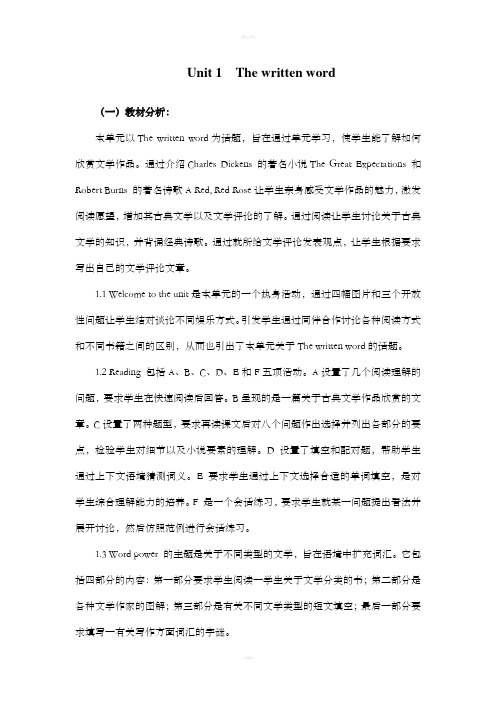
Unit 1 The written word(一)教材分析:本单元以The written word为话题,旨在通过单元学习,使学生能了解如何欣赏文学作品。
通过介绍Charles Dickens 的著名小说The Great Expectations 和Robert Burns 的著名诗歌A Red, Red Rose让学生亲身感受文学作品的魅力,激发阅读愿望,增加其古典文学以及文学评论的了解。
通过阅读让学生讨论关于古典文学的知识,并背诵经典诗歌。
通过就所给文学评论发表观点,让学生根据要求写出自己的文学评论文章。
1.1 Welcome to the unit是本单元的一个热身活动,通过四幅图片和三个开放性问题让学生结对谈论不同娱乐方式。
引发学生通过同伴合作讨论各种阅读方式和不同书籍之间的区别,从而也引出了本单元关于The written word的话题。
1.2 Reading 包括A、B、C、D、E和F五项活动。
A设置了几个阅读理解的问题,要求学生在快速阅读后回答。
B呈现的是一篇关于古典文学作品欣赏的文章。
C设置了两种题型,要求再读课文后对八个问题作出选择并列出各部分的要点,检验学生对细节以及小说要素的理解。
D 设置了填空和配对题,帮助学生通过上下文语境猜测词义。
E 要求学生通过上下文选择合适的单词填空,是对学生综合理解能力的培养。
F 是一个会话练习,要求学生就某一问题提出看法并展开讨论,然后仿照范例进行会话练习。
1.3 Word power 的主题是关于不同类型的文学,旨在语境中扩充词汇。
它包括四部分的内容:第一部分要求学生阅读一学生关于文学分类的书;第二部分是各种文学作家的图解;第三部分是有关不同文学类型的短文填空;最后一部分要求填写一有关写作方面词汇的字谜。
1.4 Grammar and usage 总结了否定句的分类、用法、构成和意义,并通过相关练习题帮助学生巩固对这种语法的掌握。
1.5 Task的主要任务是写出一文学评论文章,其中包含了3种技巧并分别设计了三个步骤帮助学生掌握这些技巧:第一了解听关键词找信息的方法;第二询问并发表观点;第三如何写文学评论文章。
牛津英语模块一unit1-project

———Project: Starting a new school club
Step 1 Lead-in
English club
Let's see some clubs!
music club
dancing club
football club basketball club
Design a
poster (海报)
Planning Preparing Producing Presenting
Planning
chess(象棋) club
basketball club
English club
football club
dancing club
clubs
boxing(拳击) club
(Line 22-23)
Who started the club?
the radio club Kate Jones
the literary club Mr. Owen
When to meet?
the radio club every morning
the literary club
the last Friday of every month
the first passage a radio club
the second one a literary club
what to do
play music, report the weather,recent news,...... (Line 9-
16)
read and discuss poems they love
music club
牛津译林版八年级英语上册Unit1知识点讲解

牛津译林版八年级英语上册Unit1知识点讲解牛津译林版八年级英语上册Unit1知识点讲解重点单词清单1. thirsty /形adj.口渴的典例I'm so thirsty. Can I get something to drink?我如此口渴。
我可以要点儿喝的吗?拓展thirsty的比较级是thirstier, 最高级是thirstiest。
honest/形adj.诚实的;正直的助记诚实的猴[ ho(u) ]待在鸟巢( nest)里。
典例an honest boy一个诚实的男孩反义: dishonest adj.不诚实的,不正直的拓展honest是以元音音素开头的单词,前面用不定冠词an。
联想honesty n.诚实,正直secret /名n.秘密典例I can’t tell you that. It’s a secret.我不能告诉你那件事。
它是个秘密。
短语* keep a secret保守秘密in secret秘密地,暗地里拓展secret adj. 秘密的care/动vi.& vt.关心,关注,在意典例:I don't care much about going to the party.我不太在意去参加那个晚会。
短语>care for 照料;喜欢care about 关心;关怀联想care n. 照管;管理;看护;小心;留神take care of照料,关怀yourself /代pron.你自己助记your( pron.你的)+self(n.自己)= yourself典例Help yourself to some fish, Ann.安,请随便吃些鱼吧。
短语*enjoy yourself玩得开心by yourself独自地,独立地help yourself to... 请随便吃拓展yourself的复数形式为yourselves.6.magazine/n.杂志典例read many kinds of magazines拓展英语中“看”的不同表达(看书read a book看电影see/ watch a film看电视watch TV看黑板look at the blackboard看医生see the doctor看窗外look out of the window7. good-looking /形adj.好看的,漂亮的助记> good( adj.好的) +looking( adj.●.....相貌的)= good-looking典例>Lucy is a good-looking girl.露西是-个漂亮的姑娘。
牛津高中英语模块8 Unit1 Grammar--project语言点讲解

Grammar1. He is raised in a place with other children who also have no parents.Raise:(1)“养大,带大”He had to raise his children on a small income. 他得靠微簿的收入来抚养子女。
The baby was raised on milk. 这婴儿是用牛奶养大的。
(2)“饲养,种植”他们靠养蚕等增加了收入。
They increased their income by raising silkworms and so on.在这个地区,人们饲养牛羊/种小麦。
In this region, people raise cattle and sheep/wheat.(3)“提出”你为什么不在会上提出这个问题?Why didn’t you raise the question at the meeting?(4)“筹集;募集”他们为这个计划筹集资金遇到了很大的困难。
They had much /great difficulty in raising money for the project.(5)“提高,提升”raise one’s voice/hand/head 提高某人的嗓音/举手/抬头raise the price of …提高。
的价格The worker_________ (raise) to a higher position. (was raised)2. Oliver was abused by his new master.Abuse: “虐待;凌辱,”“滥用;乱用”(1)奴隶主有权任意打骂、甚至杀害奴隶。
The slave-owner had the right to beat, abuse or even kill slaves at will.Stop abusing the old horse.(2)我把照相机借给你,你可别瞎用。
牛津高中英语1-8模块重点词汇讲解[二]
![牛津高中英语1-8模块重点词汇讲解[二]](https://img.taocdn.com/s3/m/9ccf0780bceb19e8b8f6ba1a.png)
牛津高中英语1—8 模块重点词汇讲解(二)11. survive(P50, M2): Of the 2,200people on the ship, only 705survived.surviveUsage 1: 不及物,幸存,残存,活下来e.g.: (1) He survived in the desert fora week on biscuits and water.在沙漠中,他靠饼干和水维持了一周。
(2) Very few of these old coins survive.这些古币几乎都失传了。
(3) -- How can you cope withthis huge amount of work?-- Don’t worry; I’ll survive.——你如何能够处理这么多工作?——别担心,我应付得来。
Usage 2: vt., 比…活得长; 经历…之后还存在e.g.: (1) Few buildings survived the fire.火灾过后,建筑物所剩无几。
(2) She survived her sons.她活得比她的儿子们长。
(3) The government is unlikelyto survive the next election.这届政府不可能逃过下届选举这一关。
扩展:survivalUsage 1: 【U】,幸存,残存;生存e.g.: (1) Hopes are fading for the survivalof the missing climbers.失踪的登山队员幸存的希望越来越渺茫了。
(2) fighting for her political survival为政治生存而斗争Usage 2: 【C】,残存物;遗迹,遗风e.g.: The fashion is a survival fromthe 1970s.这种款式是上世纪70年代的遗风。
牛津高中英语模块8unit1Project j(基础教学)

直到四海涸竭,亲爱的 直到太阳把岩石消熔 我会永远爱你,亲爱的
只要生命无穷
你那么美,漂亮的姑娘
再见吧,我唯一的爱人
我爱你那么深切
再见吧,小别片刻
我会永远爱你,亲爱的
我会回来的,我的爱人
一直到四海涸竭
即使相隔万里
教学资料
10
DETAILED-READING
PART 3 (7)
2. What does “sands o’ life” mean? A. Time flies, so we should treasure time. B. Love is great, but it has its limits. C. Life consists of happiness and sadness. D. Life is worthless like sands.
教学资料
8
DETAILED-READING
Old Scottish English
Modern English
luve melodie thou art
thee gang Till a’ the seas wi’ the sun the sands o’ life Tho’ it were
love melody you are
you go Till all the seas with the sun the sand of life Though it were
fare thee weel 教学资料 fare you well
9
一朵红红的玫瑰
罗伯特.彭斯
啊!我爱人象红红的玫瑰 在六月里苞放
啊!我爱人象一支乐曲 乐声美妙、悠扬
教学资料
3
牛津高中英语模块一语言点
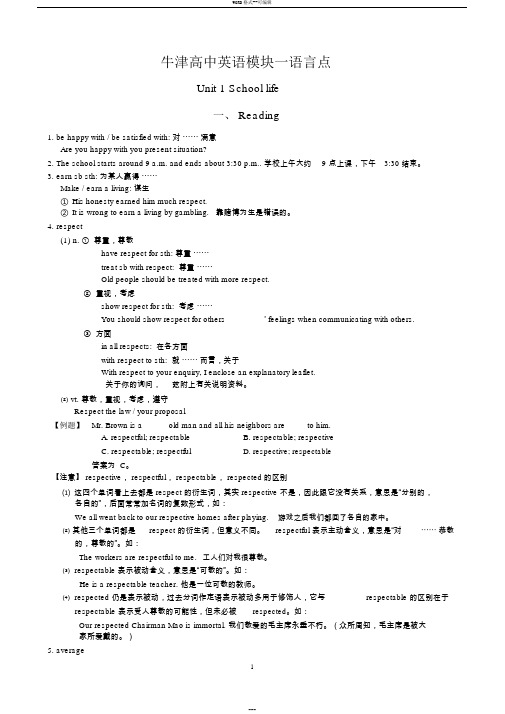
牛津高中英语模块一语言点Unit 1 School life一、 Reading1.be happy with / be satisfied with: 对⋯⋯满意Are you happy with you present situation?2. The school starts around 9 a.m. and ends about 3:30 p.m.. 学校上午大约9 点上课,下午3:30 结束。
3.earn sb sth: 为某人赢得⋯⋯Make / earn a living: 谋生①His honesty earned him much respect.②It is wrong to earn a living by gambling. 靠赌博为生是错误的。
4.respect(1)n. ①尊重,尊敬have respect for sth: 尊重⋯⋯treat sb with respect: 尊重⋯⋯Old people should be treated with more respect.② 重视,考虑show respect for sth: 考虑⋯⋯You should show respect for others’ feelings when communicating with others.③ 方面in all respects: 在各方面with respect to sth: 就⋯⋯而言,关于With respect to your enquiry, I enclose an explanatory leaflet.关于你的询问,兹附上有关说明资料。
⑵ vt. 尊敬,重视,考虑,遵守Respect the law / your proposal【例题】Mr. Brown is a _____ old man and all his neighbors are ____ to him.A. respectful; respectableB. respectable; respectiveC. respectable; respectfulD. respective; respectable答案为 C。
unit1Grammar --形容词比较级和最高级变化规则和用法(含答案)牛津英语八年级上册
形容词比较级和最高级变化规则和用法什么是形容词形容词(adjective)是词类的一种,主要用来描写或修饰名词或代词,表示人或事物的性质、状态、特征或属性,常用作定语,也可作表语或补语。
形容词通常置于其修饰的名词之前,并且多数形容词具有比较级和最高级。
一、形容词比较级和最高级的变化规则1、一般情况下,直接在形容词后加er或est.如: tall(高的)–taller(更…)–tallest(最…)old(年长的)-older(更…)–oldest(最…)small(小的)– smaller (更…)–smallest(最…)long (长的)– longer (更…)–longest (最…)2、以不发音的e结尾的形容词,直接在其后加r或st.如: nice (美好的)–nicer(更…) –nicest(最…)wide(宽的) – wider (更…)– widest(最…)larger(大的)–larger(更…)–largest(最…)late(晚的,迟的)–later(更…)–latest(最…)3、结尾只有一个元音字母和一个辅音字母的(或以辅音+元音+辅音字母结尾的),双写最后的一个辅音字母,再加er或est.如: thin(瘦的)–thinner(更…)–thinnest(更…)big(大的)–bigger(更大的)–biggest(最…)hot(热的)–hotter(更…)–hottest(最…)red(红色的)–redder(更…)–reddest(最…)4、以“辅音字母+y”结尾的形容词,变y为i再加er或est.如: happy(高兴的)–happier(更…)–happiest(最…)funny(有趣的)–funnier(更…)–funniest(最…)heavy(重的)–heavier(更…)–heaviest(最…)easy(容易的)–easier(更…)–easiest(最)5、两个或两个以上的形容词,比较级前加more,最高级前面加most.如: beautiful(美丽的)–more beautiful(更…)–most beautiful(最…)careful(仔细的)–more careful(更…)-most careful(最…)important(重要的)–more important(更…)–most beautiful(最…)6、特殊情况如: good(好的)–better(更…)–best(最…)many/much(许多的)–more(更多的)–most(最多的)bad/ill(坏的,病的)–worse(更坏的)–worst(最坏的)little(小的,很少的)–less(更少的,更小的)–least(最小的,最少的)二、形容词比较级和最高级的用法(句型结构)1、形容词比较级的用法形容词比较级用于两个人或物之间的比较。
_Unit1 Grammar 知识点整理及练习牛津译林版英语八年级上册

8AU1Grammar-2形容词的比较级和最高级四、形容词最高级的用法1.基本用法:形容词的最高级用于三个或者三个以上的人或者事物进行比较。
它前面通常要有定冠词the,后面通常接“of……/in……”当比较的范围与主语是同一类人或物,或属于同一概念时,要用介词of引导的短语;当比较的范围与主语不是同一类人或物,强调在某一范围或场所内进行比较时,要用介词in引导的短语。
Measles is the most serious of the three illnesses.麻疹是这三种疾病中最严重的一种。
You are the best student in our school.你是我们学校最好的。
[巩固练习](1)我们三个人中Simon 最擅长讲笑话。
(2)这家店里最贵的电脑也是最好的。
(3)英语是重要的外语之一。
答案:(1)Simon is the best at telling funny jokes of us three.(2)The most expensive computer is also the best in this shop.(3)English is one of the most important foreign languages.[经典例题](1)—Which month has ___________ days, February, March or April?—February.A. the leastB. the mostC. the fewestD. the shortest(2)—Millie has__________tomatoes, but she has __________juice among the three of us.A. fewer; lessB.the most; the leastC. the most; the fewestD. fewer; more(3)What_________honest boy! And he is________best student of all.A. a ; aB. an ; /C. a ; theD. an ; the(4)This bag is not expensive. And the price of it is the ________ of the three.A. lowestB. cheapestC. highestD. most expensive(5)—Guess what! The university has accepted my application (申请)!—Wow! That’s________new I’ve heard this year, Boris! Let’s celebrate.A. a worseB. the worstC. a betterD. the best(6)—Which of those radios sounds________?—The smallest one .A. goodB. wellC. betterD. best(7)Which city is______, Beijing, Shanghai or Fuzhou?A. beautifulB. more beautifulC. much more beautifulD. the most beautiful(8)________ all the stars, the sun is _________ to the earth.A. In; the nearestB. among; the nearerC. In; the most nearD. Of; the nearest(9)________all the subjects,I like PE best.A.ForB. BetweenC.WithD.Among(10)Weedy and Sandy always________and they are________students in our class.A . work hard; the most hard-working B. hard work; the most hard-workingC. work hard; hard-workingestD. hard work; the hard-workingest答案:CBDAD DDDDA2.序数词后面用最高级,构成“the+序数词+形容词的最高级”结构,表示“第几大/长/远……”Luzhou airport is the second largest airport in Sichuan.泸州机场是四川第二大的机场。
牛津译林版八下Unit 8知识点总结梳理
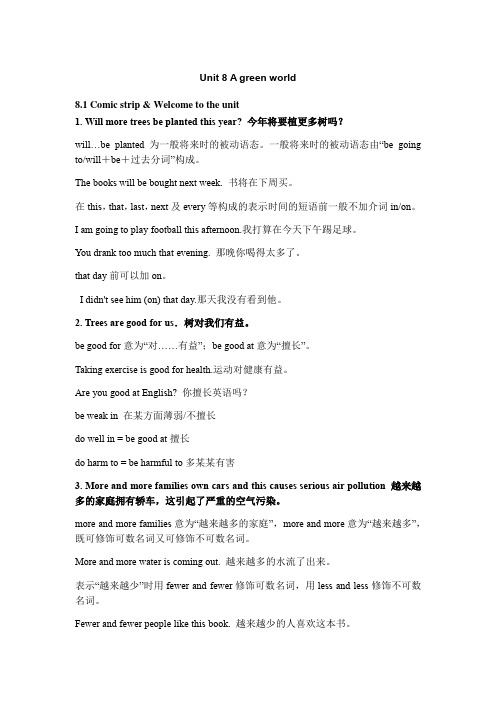
Unit 8 A green world8.1 Comic strip & Welcome to the unit1.Will more trees be planted this year? 今年将要植更多树吗?will…be planted为一般将来时的被动语态。
一般将来时的被动语态由“be going to/will+be+过去分词”构成。
The books will be bought next week. 书将在下周买。
在this,that,last,next及every等构成的表示时间的短语前一般不加介词in/on。
I am going to play football this afternoon.我打算在今天下午踢足球。
You drank too much that evening. 那晚你喝得太多了。
that day前可以加on。
I didn't see him (on) that day.那天我没有看到他。
2. Trees are good for us.树对我们有益。
be good for意为“对……有益”;be good at意为“擅长”。
Taking exercise is good for health.运动对健康有益。
Are you good at English? 你擅长英语吗?be weak in 在某方面薄弱/不擅长do well in = be good at擅长do harm to = be harmful to多某某有害3. More and more families own cars and this causes serious air pollution 越来越多的家庭拥有轿车,这引起了严重的空气污染。
more and more families意为“越来越多的家庭”,more and more意为“越来越多”,既可修饰可数名词又可修饰不可数名词。
牛津译林版八年级英语上册8A unit1单元知识点归纳总结
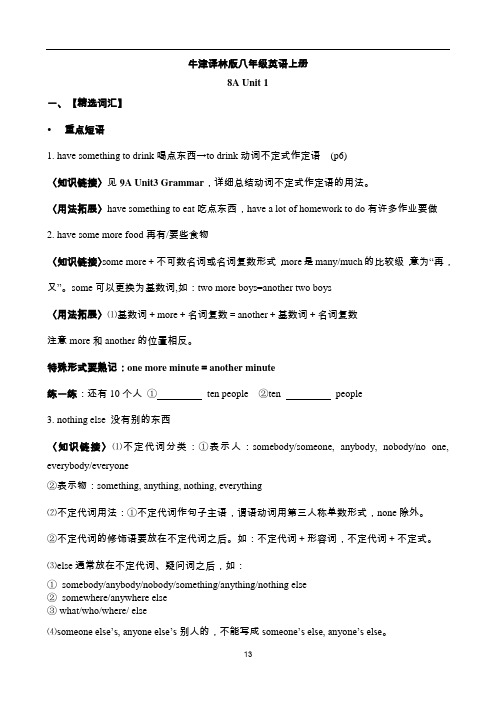
牛津译林版八年级英语上册8A Unit 1一、【精选词汇】重点短语1. have something to drink喝点东西→to drink动词不定式作定语(p6)〈知识链接〉见9A Unit3 Grammar,详细总结动词不定式作定语的用法。
〈用法拓展〉have something to eat吃点东西,have a lot of homework to do有许多作业要做2. have some more food再有/要些食物〈知识链接〉some more+不可数名词或名词复数形式,more是many/much的比较级,意为“再,又”。
some可以更换为基数词,如:two more boys=another two boys〈用法拓展〉⑴基数词+more+名词复数=another+基数词+名词复数注意more和another的位置相反。
特殊形式要熟记:one more minute=another minute练一练:还有10个人①ten people ②ten people3. nothing else 没有别的东西〈知识链接〉⑴不定代词分类:①表示人:somebody/someone, anybody, nobody/no one, everybody/everyone②表示物:something, anything, nothing, everything⑵不定代词用法:①不定代词作句子主语,谓语动词用第三人称单数形式,none除外。
②不定代词的修饰语要放在不定代词之后。
如:不定代词+形容词,不定代词+不定式。
⑶else通常放在不定代词、疑问词之后,如:①somebody/anybody/nobody/something/anything/nothing else②somewhere/anywhere else③ what/who/where/ else⑷someone else’s, anyone else’s别人的,不能写成someone’s else, anyone’s else。
- 1、下载文档前请自行甄别文档内容的完整性,平台不提供额外的编辑、内容补充、找答案等附加服务。
- 2、"仅部分预览"的文档,不可在线预览部分如存在完整性等问题,可反馈申请退款(可完整预览的文档不适用该条件!)。
- 3、如文档侵犯您的权益,请联系客服反馈,我们会尽快为您处理(人工客服工作时间:9:00-18:30)。
Grammar
1. He is raised in a place with other children who also have no parents.
Raise:
(1)“养大,带大”
He had to raise his children on a small income. 他得靠微簿的收入来抚养子女。
The baby was raised on milk. 这婴儿是用牛奶养大的。
(2)“饲养,种植”
他们靠养蚕等增加了收入。
They increased their income by raising silkworms and so on.
在这个地区,人们饲养牛羊/种小麦。
In this region, people raise cattle and sheep/wheat.
(3)“提出”
你为什么不在会上提出这个问题?Why didn’t you raise the question at the meeting?
(4)“筹集;募集”
他们为这个计划筹集资金遇到了很大的困难。
They had much /great difficulty in raising money for the project.
(5)“提高,提升”raise one’s voice/hand/head 提高某人的嗓音/举手/抬头
raise the price of …提高。
的价格
The worker_________ (raise) to a higher position. (was raised)
2. Oliver was abused by his new master.
Abuse: “虐待;凌辱,”“滥用;乱用”
(1)奴隶主有权任意打骂、甚至杀害奴隶。
The slave-owner had the right to beat, abuse or even kill slaves at will.
Stop abusing the old horse.
(2)我把照相机借给你,你可别瞎用。
I’ll lend you my camera but don’t abuse it.
Abuse one’s authority(power) 滥用职权(权力)
(3)绝不能允许他们滥用职权
They should never be allowed to abuse their authority and position.
(4)不要这样工作,否则会把身体搞垮的。
Don’t abuse your health by working like that.
3. care about “在乎;在意;对。
关心”
(1)这位黑人领袖说,他唯一关心的是黑人得到公平待遇。
The black leader said that the only thing he cared about was justice for his people.
(2)他只想到自己,不关心别人。
He thinks only of himself; he doesn’t care about other people.
(3)你怎么想不关我的事。
I don’t care about what you think.
(4)你不怕丢掉工作吗?Don’t you care about losing your job?
【辨析】care about; 和care for 前者为“在乎;在意;对。
关心”,后者表示“喜欢;对。
感兴趣”
(1)上周我读了那首诗,不过我一点也不喜欢。
I read the poem last week but I didn’t care for it at all
(2)我不太喜欢骑自行车,我宁愿步行。
I don’t care for riding on a bike very much; I would rather go on foot.
4. pressure vt.“对。
施加压力;强迫”
Pressure sb. to do sth. Pressure sb. into doing sth.
他们强迫他释放囚犯。
They have pressured him into freeing the prisoners.
他被迫立即做出决定。
He was pressured into making a decision immediately.
n. “压力;压迫”
(1)公众舆论的强大压力迫使他辞职了。
The strong pressure of the public opinion drove him from office.
(2)我们正努力给政府施压修改法律。
We are trying to put pressure on the government to change the law.
(3)由于工作上的压力,他不能来参加晚会。
He couldn’t come to the party because of pressure of work.
5. resist vi.&vt.
A:“抵抗;抗拒”
(1)他们奋力抵抗,但是埙失了大量的兵力和枪支。
They resisted desperately but lost a large number of guns and men.
(2)敌人抵抗不住都纷纷逃命了。
The enemy couldn’t resist any longer and ran for their lives.
(3)我顶住了他们想要影响我的所有企图。
I resisted all their attempts to influence me.
(4)这是一种耐高温的盘子。
It’s a kind of glass plate that resists heat.
B:“忍住;抵制;禁不住要”常用于否定句,后接动名词。
(1)她情不自禁地拿他的光头开玩笑。
She couldn’t resist making jokes about his baldness.
(2)他觉得要克服购买这些书的欲望是困难的。
He found it hard to resist buying these books.
(3)在那些场合她总忍不住要笑。
She could hardly resist laughing on those occasions.
6.deserve “应得(奖惩等)”“值得(注意等)”
(1)这个问题值得我们注意。
This question deserves our attention.
(2)他受到了应得的惩罚。
He got the punishment he deserved
(3)这些看法值得认真考虑。
These views deserve serious consideration.
(4)我工作做得不多,不应当受到这样的表扬和荣誉。
I have done so little and I don’t deserve such praise and honour.
★【注意】deserve后接动名词的一般式时,其主语与动名词之间在逻辑上是被动关系,如用不定式,应使用被动式。
类似的词还有need, want, require.
(1)我感觉到像那样的人是值得照料的。
I feel a man like that deserves looking after.
1。
